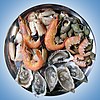Alligator meat is the meat from alligators that is for consumption. In the United States, alligator meat is commonly eaten, where it is regarded as a delicacy and staple in local cuisines both historically and in modern times. Alligator eggs can also be consumed. Alligator meat is high in protein and low in fat, and has a mild flavor and firm texture.



In the United States, gator meat is available for consumer purchase in specialty food stores, some grocery stores, and can also be mail ordered.
Composition
A 100-gram (3+1⁄2-ounce) reference serving of alligator meat provides 600 kilojoules (143 kilocalories) of food energy, 29 grams of protein, 3 percent fat and 65 milligrams of cholesterol. It also contains a significant amount of phosphorus, potassium, vitamin B12, niacin and monounsaturated fatty acids.
Alligator meat has been described as having a mild flavor and a firm texture. It tastes like quail, with a mildly fishy flavor, and is often chewy, depending on preparation.
Preparation
Various methods of preparation and cooking exist, including tenderization, marination, deep frying, stewing, roasting, smoking and sauteeing. Alligator meat is used in dishes such as gumbo, and is used in traditional Louisiana Creole cuisine. It also can be made into pet food.
Cuts from the animal used include meat from the animal's tail and backbone, which have been described as "the choicest cuts".
History

United States
In the mid-1800s, alligator meat was used in some regional cuisines in parts of the Southern United States. During this time, it was used in dishes such as gumbo.
Alligator eggs were a part of the cuisine in many areas of the Southern United States in the early 1900s. During this time people would harvest the eggs and then sell them as a source of income.
Harvesting of wild alligator eggs is illegal without a proper permit; violators face serious fines and jail time.
Religion
Islam
It is a matter of ongoing debate among Islamic scholars as to whether alligator meat is halal. Some consider alligator haram as a predatory animal. However, due to their aquatic nature, alligator meat is generally deemed halal, following the same tenets that apply to fish and other scaled aquatic life. Alligator meat is not explicitly condemned under Sharia.
Legal status
United States
In the United States, farming alligator for meat and hides is legal and practiced in states such as Georgia, South Carolina, Alabama, Arkansas, Mississippi, North Carolina, Florida, Louisiana, and Texas.
Alligator hunting is legal in Arkansas, South Carolina, Louisiana, Florida, Georgia, and Texas.
See also
References
- IFIS Dictionary of Food Science and Technology – International Food Information Service. John Wiley & Sons. 2009-05-26. ISBN 9781405187404. Retrieved 2017-03-13.
- Martin, Roy E.; Carter, Emily Paine; George j. Flick, Jr; Davis, Lynn M. (4 April 2000). Marine and Freshwater Products Handbook. CRC Press. ISBN 9781566768894. Retrieved 2017-03-13.
- ^ Miami Spice: The New Florida Cuisine – Steven Raichlen. Workman Publishing. 1993-01-11. p. 35. Retrieved 2017-03-13 – via Internet Archive.
- ^ Cincinnati Magazine. June 1986.
- ^ New Orleans – Pableaux Johnson, Charmaine O'Brien. p. 50.
- "What Do Snake and Other Exotics Meats Taste Like". The Daily Meal. January 22, 2015. Retrieved 2017-03-13.
- Producing Meat – Rachel Lynette. pp. 28-29.
- ^ Spilsbury, Richard (2004). Alligator – Richard Spilsbury. Heinemann-Raintree Library. ISBN 9781403448576. Retrieved 2017-03-13.
- ^ The Alligator and Its Allies – Albert Moore Reese. 1915. pp. 35-36.
- "FWC uncovers illegal alligator egg-harvesting operation". 24 May 2017.
- "Eating Alligator Meat: Is It Halal (Lawful)? - Fiqh". IslamOnline. 2022-11-28. Retrieved 2024-08-31.
- Nolan, Lila (2024-04-01). "From Swamp to Profit: Could You Handle Crocodile and Alligator Farming?". Morning Ag Clips. Retrieved 2024-12-07.
- "Alligator Hunting Regulations Overview | Louisiana Department of Wildlife and Fisheries". Wlf.louisiana.gov. Retrieved 2019-03-12.
- "Alligator — Texas Parks & Wildlife Department". Tpwd.texas.gov. Retrieved 2019-03-12.
.
Further reading
- The Culinary Herpetologist. p. 132.
- Leak, Fred W. (1987). A Further Analysis of Florida Alligator Meat as a Wholesome Food Product. Florida Department of Agriculture and Consumer Services, Division of Marketing.
- Thorbjarnarson, J.; Wang, X.; Schaller, G.B. (2010). The Chinese Alligator: Ecology, Behavior, Conservation, and Culture. Johns Hopkins University Press. p. 153. ISBN 978-0-8018-9348-3. Retrieved October 17, 2019.
- Deutsch, J. (2018). We Eat What? A Cultural Encyclopedia of Unusual Foods in the United States. ABC-CLIO. pp. 3–4. ISBN 978-1-4408-4112-5. Retrieved October 17, 2019.
External links
- [REDACTED] Media related to Alligator meat at Wikimedia Commons
| Meat | |||||
|---|---|---|---|---|---|
| Poultry |   | ||||
| Livestock | |||||
| Game | |||||
| Fish | |||||
| Shellfish and other seafood | |||||
| Insects | |||||
| Cuts and preparation |
| ||||
| List articles |
| ||||
| Ethics and psychology | |||||
| Alternatives | |||||
| Meat science | |||||
| Meat industry | |||||
| Related subjects | |||||